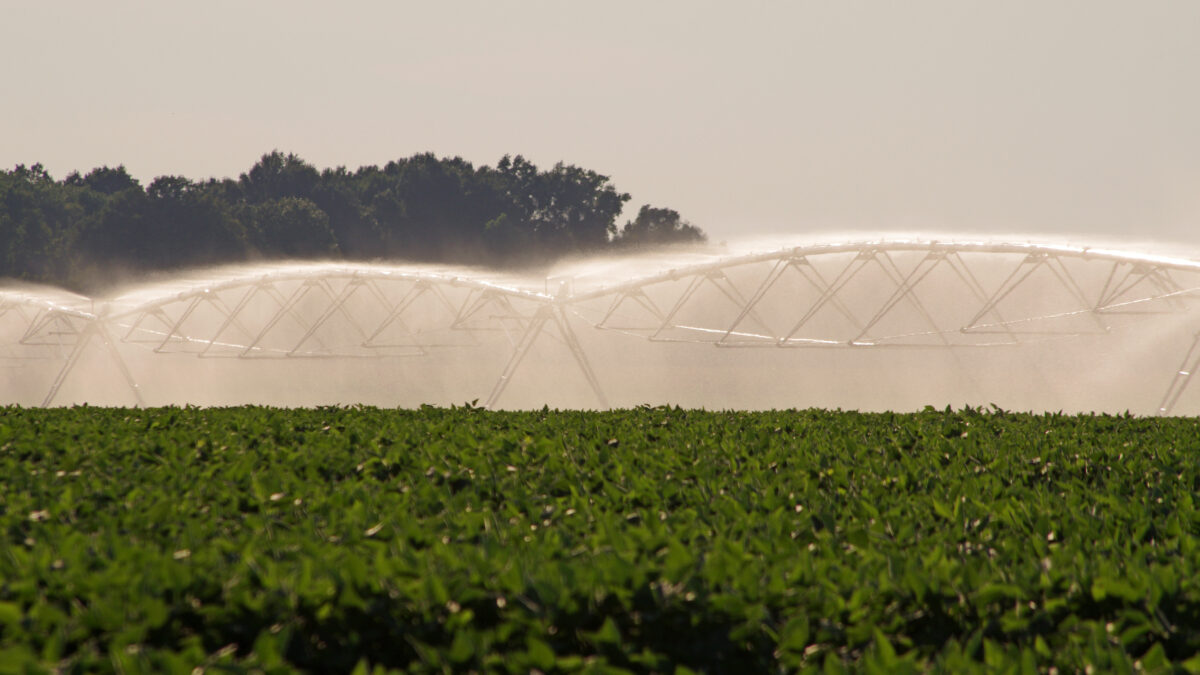Growing Sustainable Solutions Together
TOPICS
SustainabilityZippy Duvall
President

photo credit: Arkansas Farm Bureau, used with permission.
Farmers and ranchers believe that each season can be better than the last. That’s the optimism driving us forward in the face of hardship and overwhelming challenges. And it’s the optimism that has been driving us for decades to adopt innovative tools and techniques to leave our land better than we found it. Looking back on agriculture’s achievements, I am optimistic for where we can be in the days and generations to come. We cannot do that work alone, however. We must grow solutions together.
Today, farmers and ranchers are being identified more and more as partners in addressing the challenges of our changing climate. I cannot think of another time when our achievements across agriculture have been so recognized by leaders and lawmakers on both sides of the aisle. Add to that the fact that farmers and ranchers rank as the most trusted professionals in the U.S. today. Americans know they can count on us to produce a safe, sustainable food supply, and we take that trust seriously.
We need to empower our brightest minds and hardest workers to develop new technologies and techniques to further our sustainability efforts.
It’s unfortunate that same respect is not being shown by some in the national media right now. A couple major publications have started singing from the activist’s song sheet rather than presenting the full story of agriculture and sustainability. These articles and editorials claim agriculture to be a major contributor to greenhouse gas emissions, ignoring the fact that EPA data shows agriculture to be a small contributor overall. Also conveniently leaving out the unique and significant characteristics of methane, the GHG emitted by animals and manure, that make it different from other industries’ emissions of carbon dioxide. I understand that a newspaper column can’t provide a full science lesson on methane’s natural cycle, with its relatively short life span of 12 years compared to the hundreds of years CO2 remains in the atmosphere. But it can be stated simply, as I just did, and noted that the short methane lifespan is relevant because as methane is being emitted, it’s also being naturally broken down in the atmosphere.
Critics are looking for simple answers to complex solutions. Instead of hurling incomplete and disparaging statements at the farmers who feed the nation, how about we engage in an honest dialogue about potential solutions and unintended consequences. The burdensome regulations some are calling for place affordable food sources at risk. Asking farmers to bear the full burden of changes will put small farms out of business, increasing consolidation and making meat more expensive. Worsening food insecurity for millions of American families is not the solution. That’s one of the reasons Farm Bureau is committed to advocating for sustainability initiatives and policies that provide the accessibility and flexibility needed by farmers and ranchers to adopt more climate-smart practices economically and in a way that strengthens our food system and food security.
Last week’s announcement of USDA’s new Climate Smart Commodities program is another important step on the path forward. Secretary Vilsack acknowledged the leadership of the Food and Agriculture Climate Alliance, which Farm Bureau co-founded, and we are pleased to see that USDA’s plan is consistent with the Alliance’s policy recommendations. With this program, USDA is empowering farmers and ranchers of all commodities, sizes, backgrounds and regions to adopt more climate smart practices. This kind of voluntary, incentive-based program will be critical in helping agriculture achieve our shared sustainability goals and keep high quality protein within reach for American families.
The Growing Climate Solutions Act is another great example of what we can do to shape the future of sustainability in agriculture. This bill passed the Senate with overwhelming bipartisan support—92 yes votes to be exact. Now we are eager for the House to pass this legislation and deliver it to the President’s desk. Of course, there is still work to be done on the policy side to ensure that programs work for all farmers and that farm data is secure in the process, but these voluntary, market-based examples show how far we have come and give us optimism about where we go from here.
Just as critical to our future success, is our nation’s investment in research and development. We need to empower our brightest minds and hardest workers to develop new technologies and techniques to further our sustainability efforts. My grandfather couldn’t have dreamed of the technology available to farmers today, and I am excited to see glimpses of the tools in store for the next generation of my family and yours. From robotics that improve our efficiency in tending and harvesting our crops to advancements that protect animals from disease, the future of our farms depends on the research at agricultural companies and land-grant universities today. We need to ensure that the latest technology is not only available, but accessible to all.
The word sustainability gets thrown around so much, it can start losing its meaning for some. But for America’s farmers and ranchers we know that we would not be able to fulfill our mission of growing food, fuel and fiber for all without sustainable practices. We are doing better today because of our commitment to care for our land, air and water, and we will continue to do better tomorrow for our families and yours.
Zippy Duvall
President
Vincent “Zippy” Duvall, a poultry, cattle and hay producer from Greene County, Georgia, is the 12th president of the American Farm Bureau Federation.
